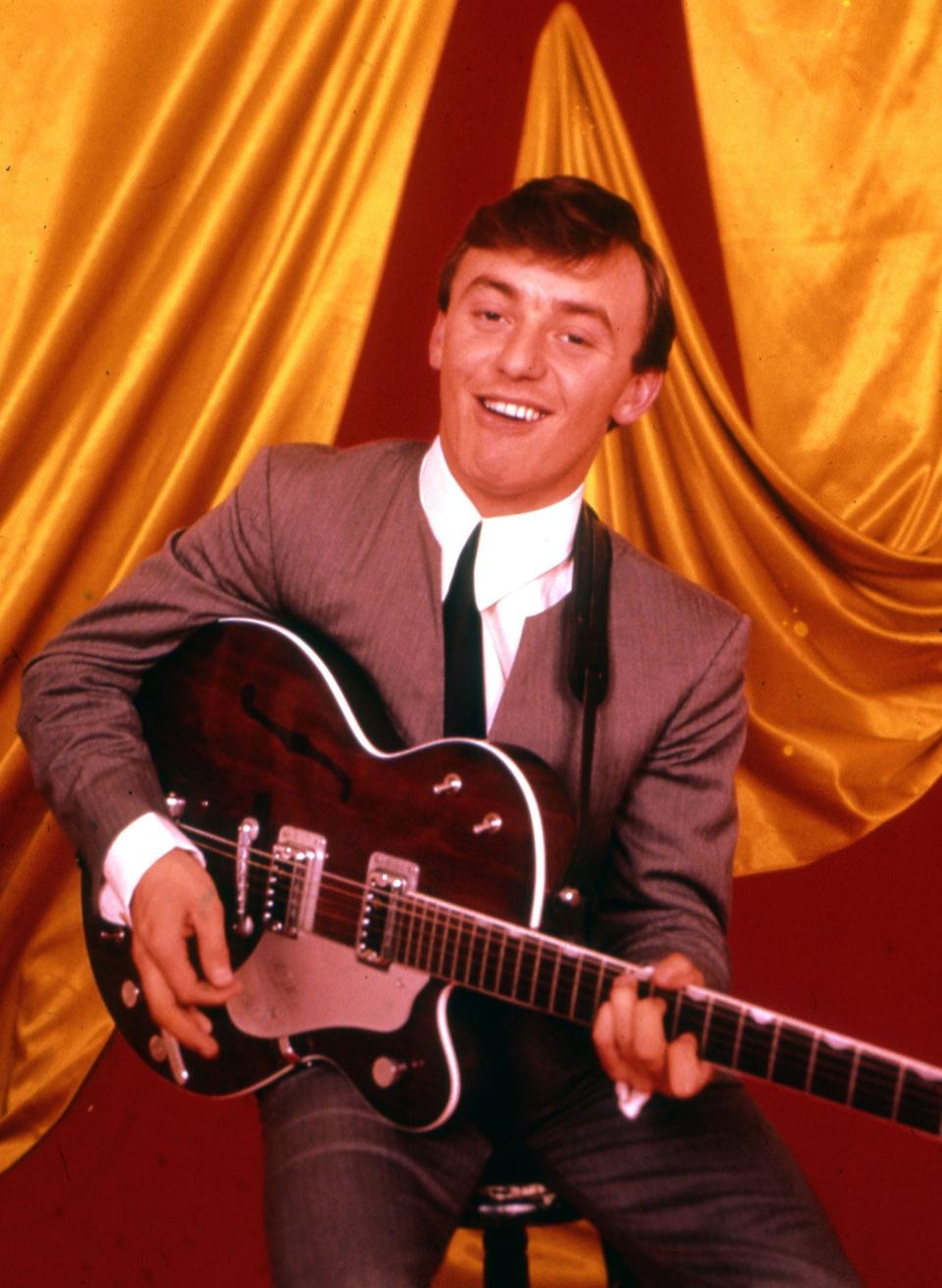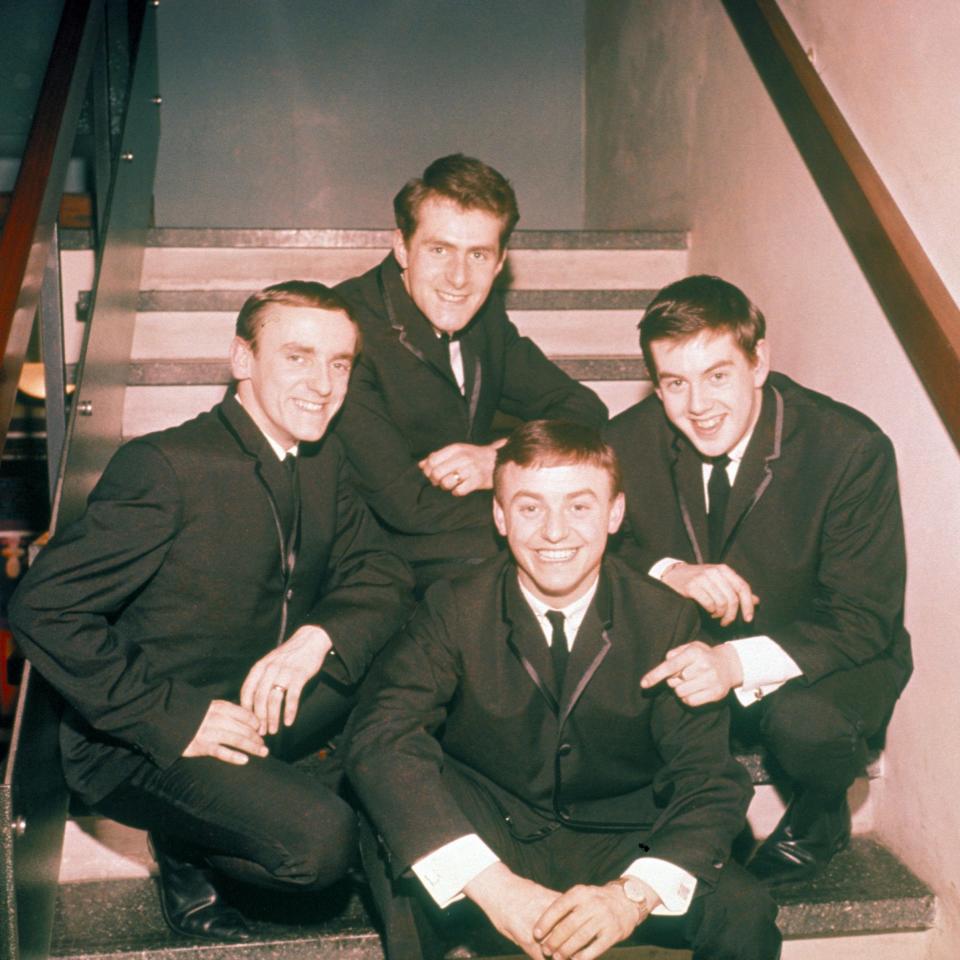Gerry Marsden, Merseybeat singer who had a string of hits with Gerry and the Pacemakers – obituary

Gerry Marsden, who has died aged 78, was the lead singer of Gerry and the Pacemakers, a band indelibly identified with the “Merseybeat” sound and briefly the Beatles’ closest rivals.
The first act to top the charts with each of their first three singles, Gerry and the Pacemakers emerged from the innovating Liverpool scene at exactly the same moment as the Fab Four. But although they shared the bill when the two bands toured together and recorded those three number ones in 1963, the distance between the Pacemakers and the Beatles swiftly grew.
While the third of those hits, You’ll Never Walk Alone, became the unofficial standard for Liverpool and its football club, the band’s light, catchy pop, upbeat lyrics and clean-cut image could not match the power and originality of Lennon and McCartney.
Nor could it compete with the increasingly complex sounds emanating from Britain and America. By the late 1960s, Merseybeat was for music historians chiefly, and Gerry and the Pacemakers, alongside other exponents, like the Searchers, were largely relegated to the cabaret and variety club ghetto.

In the 1980s, Marsden returned briefly to the limelight when You’ll Never Walk Alone and Ferry Cross the Mersey recharted as charitable records, released to raise money for the victims of the Bradford City and Hillsborough football stadium disasters.
Gerry Marsden was a singer who lived to perform. For more than 60 years after his golden year he cheerfully trooped around draughty concert halls, delighting ageing fans with renditions of his most famous hits. He revived memories of his part in that joyful moment when Liverpool exploded in creativity and rock music and R & B crossed the Atlantic and established themselves permanently on these shores.
He was born in Liverpool on September 24 1942; his father was a railwayman who played ukulele in a bar on Saturday nights. As a teenager Gerry was a promising boxer, a profession he considered but rejected after a “battering” from the future bantamweight champion, Alan Rudkin.
At 14 he formed a skiffle group called Red Mountain Boys. They morphed into Gerry and the Pacemakers after their initial choice of name, The Mars Bars – selected specifically to attract corporate sponsorship – elicited nothing more promising from the sweet company than the threat of copyright litigation.
In 1960, having appeared on the same bill as Gene Vincent at the Liverpool Stadium two weeks after the car crash in which Vincent was injured and Eddie Cochran killed, they relocated to Hamburg where they performed – on and off – for the next three years. There, like the Beatles, with whom they became close friends, they honed their craft playing seven hour-long sets each night, with a 15-minute break.
Back in Liverpool, they enjoyed residencies at the Cavern and the Casbah and quickly became leaders of an exciting music scene. By 1961 there were more than 600 groups fighting for space in the city, including the Searchers, Freddie Starr and the Midnighters, Billy J Kramer and the Dakotas and Rory Storm and the Hurricanes, for whom Ringo Starr was still drumming.
Marsden recalled: “Every street had a pub filled with music and seamen home from the States and all over the world were playing music.” That music, the early rock ’n roll inspired by Little Richard and Chuck Berry, was quickly dubbed the “Mersey Beat”.
Such was the similarity of their sound that Gerry and the Pacemakers appeared regularly on the same bill as the Beatles and on one occasion even played with them, the two groups performing together as the Beatmakers.
In 1962 Marsden gave up his job as a tea-chest maker, having previously worked on the railways and in Woolworths, and the band was signed by the Beatles’ manager, Brian Epstein. He never made them rich, according to Marsden, “because he couldn’t even look after himself financially”. But he did teach them “to wear a suit, smoke filters instead of Woodbines and, mainly, how to talk friendly to people”.
He also introduced them to George Martin, who recorded their first single, How Do You Do It? A Mitch Murray song, it had previously been offered to Adam Faith, who did not like it, and the Beatles, who rejected it in favour of their own compositions. Nevertheless, Gerry and the Pacemakers’ breezy version unexpectedly topped the charts in March 1963, until dethroned by the Beatles’ From Me To You.
That year the group toured with Roy Orbison and the Beatles. But Beatlemania was under way and the Fab Four were soon the undisputed headliners. The Pacemakers’ second single, I Like It, another Murray song written specifically for them, topped the charts in May.
For their third single, Epstein was keen that they should record a Lennon/McCartney composition, Hello Little Girl, but Marsden rejected it in favour of the Rodgers and Hammerstein classic, You’ll Never Walk Alone, taken from the musical Carousel.

Having performed it on Ready, Steady, Go immediately after the announcement of the assassination of President Kennedy, the song took on a life of its own.
All in all it spent 22 weeks in the chart and gave the band the distinction of reaching No 1 with their first three releases, an achievement unequalled until another Liverpool band, Frankie Goes To Hollywood, managed it in 1984 – their first hit, Relax, coincidentally with a cover of Marsden’s Ferry Cross the Mersey on its B-side.
Regularly played before kick-off at Anfield, with its surging feeling that was never far from hokum, You’ll Never Walk Alone was embraced by a stadium in which football was considered more than a matter of life and death. Over 60 years there was no denying its emotional pull.
Having performed the song on several emotive occasions, notably the memorial service in Liverpool Cathedral for the former Liverpool football manager Bill Shankly, in 1985 it was re-recorded by “The Crowd”, a host of pop stars with Liverpudlian connections to raise money for the victims of the Bradford football disaster. Again climbing to No 1, it made Marsden the first man to top the chart with different versions of the same song.
Trailered by this success, their first album How Do You Like It? (1963) reached No 2 and their next single, I’m the One, the first to be written by Marsden, was only denied the top spot by The Searchers’ Needles and Pins.
An underrated songwriter, largely on account of his identification with the ubiquitous You’ll Never Walk Alone, it was still unfortunate when Marsden’s hit ballad Don’t Let the Sun Catch You Crying was successfully sued for breach of copyright by Ray Charles, who had composed a song with the same title.
As key players in the “Mersey Sound”, the British “invasion” of America – they first toured in 1964 – and Brian Epstein’s stable, Gerry and the Pacemakers launched a magazine published by the same press as Beatles Monthly.
They also starred in their own film, Ferry Cross The Mersey (1964), written by Tony Warren, the creator of Coronation Street, and shot on location in Liverpool, featuring a roster of local acts including Cilla Black and The Fourmost.
An anodyne drama recounting the rise of a local band, played by Gerry and the Pacemakers, it lacked both the zany esprit (and the success) of the contemporaneous A Hard Day’s Night.
While the theme to the film, for which Marsden wrote all the songs, became the band’s last Top 10 hit – though it would reach No 1 as a charity record in 1989, after Hillsborough – the soundtrack (1964) reached the Top 20 on both sides of the Atlantic.
But with the band’s subsequent efforts seeing dwindling returns, the release of their Greatest Hits in 1965 seemed like a valediction. After an unsuccessful attempt to reflate the You’ll Never Walk Alone balloon with the self-penned Walk Hand In Hand, the band split in 1967, victims not only of the Beatles phenomenon and endless unflattering comparisons, but of their inability to break out of the one-paced cheeriness of Merseybeat.
Despite his steep rise and fall, Marsden remained a man wary of hyperbole. He confessed that the Beatles’ psychedelic phase “just wasn’t the Beatles to me” and described George Harrison as a musician who “fitted in and played a nice guitar”.
It was an easy sensibility ideally suited to Marsden’s post-Pacemakers career. He continued to pound the nostalgia circuit, touring annually with and without various permutations of the Pacemakers and releasing anniversary versions of his greatest hits. Embarking on a 41-date tour in 2014 Marsden told the Daily Express: “I still get a buzz from performing live.”
In his early sixties he underwent a heart bypass operation (later he was fitted with a pacemaker, which, he told an interviewer, was not “funny”).
Beyond music, he starred in the West End production of the musical Charlie Girl for three years from 1968, scored further theatrical success in Pull Both Ends and was a regular on the Sooty television show.
Gerry Marsden was appointed MBE for services to charity in 2002.
He married, in 1965, Pauline Behan, the secretary of his fan club. They had two daughters and divided their time between Chester and Spain, where he once owned a house opposite Lonnie Donegan.
Gerry Marsden, born September 24 1942, died January 3 2021

 Yahoo News
Yahoo News 
